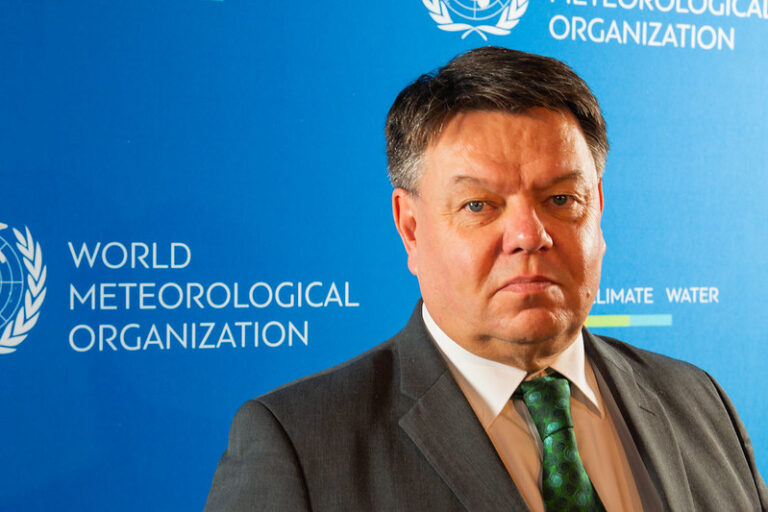The Systematic Observations Financing Facility (SOFF) will support countries to generate and exchange basic observational data critical for improved weather forecasts and climate services. It will provide technical and financial assistance in new ways – applying internationally agreed metrics to guide investments, using data exchange as a measure of success, and creating local benefits while delivering on a global public good.
The official launch of SOFF is planned for the UN Climate Change Conference (COP26) in November 2021. It is envisioned that SOFF will start operating with an initial five-year implementation period, during which it will prioritize support to Least Developed Countries (LDCs) and the Small Islands Developing States (SIDS).
In this interview, WMO secretary general, Petteri Taalas, outlines the importance of SOFF with regards to climate adaptation and resilience across the globe, benefitting in particular the most vulnerable.
Why is SOFF so vitally needed?
In the face of climate change, LDCs and SIDS are paying the highest price. 2020 was one of the three warmest years on record and the threat of unprecedented climatic change has demonstrated how important it is, now more than ever, to act quickly and build a more resilient world.
SOFF is so vitally important now because it will improve the availability of basic weather observations leading to better weather forecasts and climate prediction. This is crucial to save lives, protect the livelihoods of the most vulnerable and will bring benefits in overall global productivity.
SOFF will strengthen global and local weather forecasting and climate prediction capabilities, which are essential to manage risks effectively, understand adaptation needs and act proactively with systematic early action.
So many countries are still so far behind in the development of their ground-based weather technology. Why has it taken until now to address this?
Investments in observations are operationally complex and require the collaboration of a multitude of partners.
So far, investments in observations have been financed by the international development community through time-bound, country-driven projects, which did not, in many instances, yield lasting results. With time, it has become clear that the global nature of the problem requires an innovative global approach and a dedicated financing mechanism.
The Alliance for Hydromet Development, which brings together the major development and climate finance institution, was created to increase the effectiveness and sustainability of hydromet investments and includes a commitment to create an innovative mechanism to systematically finance observation – the SOFF.
The establishment of the Global Basic Observing Network (GBON) concept in 2019 provided a great opportunity to achieve this, as the GBON establishes a global approach and its regulations specify, for the first time, in clear, quantitative terms the obligation of the WMO members to acquire and exchange essential observations, including which parameters to measure, how often, at what horizontal and vertical resolution, when and how to exchange them, and which measurement techniques are appropriate to use. However, many countries need substantial investments and strengthened capacity to achieve and maintain compliance with the GBON requirements.
SOFF is complementary to GBON and will address the issue of missing basic observations by using an innovative approach. Recognizing the global public good contribution provided by these data, SOFF will provide technical and financial assistance to countries in new ways, to enable them to sustainably generate and exchange basic observations in compliance with the GBON requirements and by guiding investments using the GBON metrics.
What is the biggest challenge to improving ground-based data in LDCs and SIDS?
As mentioned above, investments aimed at improving ground-based observations are complex and a number of challenges have hindered the effective provision of these data from LDCs and SIDS.
The biggest challenge observed is associated with the sustainability of the current financing model for observations and the inadequate budget for operation and maintenance of the observing networks.
The lack of human resources also plays an important role, as many NMHSs in these countries lack trained local staff. For this reason, SOFF puts emphasis not only on infrastructure investment but also on developing human and institutional capacity.
A number of challenges related to technology have also been observed. For instance, so far development and climate finance partners provided components of countries’ basic observing network in a fragmented manner, relying on different vendors with interoperability challenges and requiring different spare parts. Issues related to the incompatibility of these components have hindered the long-term operability of the observing systems. SOFF will support countries to implement GBON through standardized single interventions with one competitive procurement of equipment for each beneficiary country and will contribute to cover the operation and maintenance costs of the observing systems.
What would be a successful outcome to the SOFF project in your view?
SOFF has one main outcome: significantly increasing the collection and international exchange of basic surface-based observations.
This will lead to a major strengthening of the global observing capabilities and the availability of better model guidance for weather and climate monitoring and prediction at all spatial scales. This will enable the provision of vastly improved and enhanced weather and climate services at global, regional, national and local levels to all WMO members. The improvement in service delivery capabilities will be especially large in the areas where the current coverage of observations is poor.
For the first implementation phase, SOFF is targeting 67 countries (LDCs and SIDS) to bring to GBON compliance over five years. This is expected to lead to at least 20-fold increase of exchanged observations from surface stations and at least 10-fold increase of exchanged observations from upper-air.



